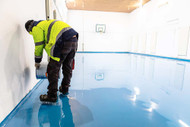The factory environment is a dynamic landscape with machinery combined with heavy foot traffic and chemical exposure on a daily basis. Factory floors demand a perfect balance between affordability and durability. Epoxy flooring has gained prominence in the industrial sector due to its versatility and cost-effectiveness. Epoxy flooring delivers robust performance within budget-friendly criteria. In this article, we will explore the different features and epoxy factory applications to learn more about its value and implementation in the factory setup.
Different types of epoxy factory flooring
Epoxy flooring is a choice in the factory for many reasons. There are various epoxy flooring options available to tailor the specific needs and requirements of the industry. Some of the major factory epoxy floorings are as follows:
1.Water-Based Epoxy Coatings
Water-based epoxy coatings are used in factories due to their fewer organic compounds (VOCs). It is safer for both the environment and workers. Ideally, the factory owners see a budget-friendly solution with less chemical resistance, so such water-based coatings are highly utilised.
2.Solvent-based epoxy coating
Solvent-based epoxy coatings tend to have a higher level of durability and chemical resistance. They are good at forming strong bonds with the substrate, creating a resilient surface. The factories with heavy machinery and high traffic areas lead to such flooring types.
3.Epoxy Mortar Systems
Epoxy mortar systems are a heavy-duty option that rely on a mixture of epoxy resin and sand or quartz aggregate. The impact of such a mixture leads to a resistant-free flooring system, and it is mostly applied to extreme floor conditions, heavy machinery traffic, or exposure to chemicals. The impact and abrasion of this type of epoxy flooring are excellent.
4.Chemical-resistant epoxy coating
Formulated with epoxy to withstand chemical and harsh environments, chemical-resistant epoxy is much needed in many factories demanding an impermeable barrier for corrosive substances and chemicals. Most of the time, essential factories dealing with highly demanded chemicals and processing laboratories have high-build chemical-resistant coatings.
High Value Appeal of Epoxy Flooring
Composed of resins and hardeners, the chemical bond-making epoxy has a seamless and high-gloss surface to withstand high traffic and chemical impact. The durability of the epoxy in the factory is increased by its cost-effective installation. Epoxy is applied directly to concrete surfaces, which reduces the cost of subfloor preparation. This reduces the cost of labour, with acceleration in the installation process allowing factories to resume operations swiftly.
Benefits of Epoxy Floors
- Versatile Options: Epoxy flooring comes in various types—water-based, solvent-based, epoxy mortar systems, and chemical-resistant coatings—allowing customization to meet specific factory needs.
- Cost-Effective Installation: Epoxy can be applied directly onto concrete surfaces, minimizing subfloor preparation costs and labor expenses. This expedites installation, enabling factories to resume operations quickly.
- Durability: Designed to withstand heavy foot traffic and machinery, epoxy flooring is highly resistant to impacts, abrasions, and chemical spills, ensuring longevity even in demanding environments.
- Reduced Maintenance: The durability of epoxy flooring decreases the frequency of repairs and replacements, leading to significant long-term savings for factory operations.
- Eco-Friendly Options: Water-based epoxy coatings contain fewer VOCs, making them safer for both the environment and workers while providing a budget-friendly solution.
- Chemical Resistance: Specific epoxy formulations can endure harsh chemicals, creating an impermeable barrier that protects floors in industries dealing with corrosive substances.
- Aesthetic Appeal: Epoxy flooring provides a seamless and high-gloss finish, enhancing the visual appeal of factory spaces while maintaining functionality.
- Long-Term Savings: The initial investment in epoxy flooring pays off over time through reduced maintenance costs and extended lifespan, making it an economical choice for factory owners.
- Increased Safety: The smooth, even surface of epoxy reduces the risk of slips and falls, contributing to a safer working environment for employees.
- High Performance: Epoxy's robust chemical bonding properties ensure that factory floors remain resilient under heavy use, solidifying its reputation as a high-value flooring solution.
Conclusion
The factory floors require high investment and value for their maintenance. In terms of cost-effective installation and resilient impact factors, epoxy flooring in the factory has its own advantages. It is the go-to option for factories seeking to maximise value without compromising the quality and durability of the floor. Business owners consider the potential budget and need to ensure its valuable implementation on the factory floor. Thus, low-cost installation with long-term savings on investment creates a bridge for increasing the high value of the epoxy factory floor.

